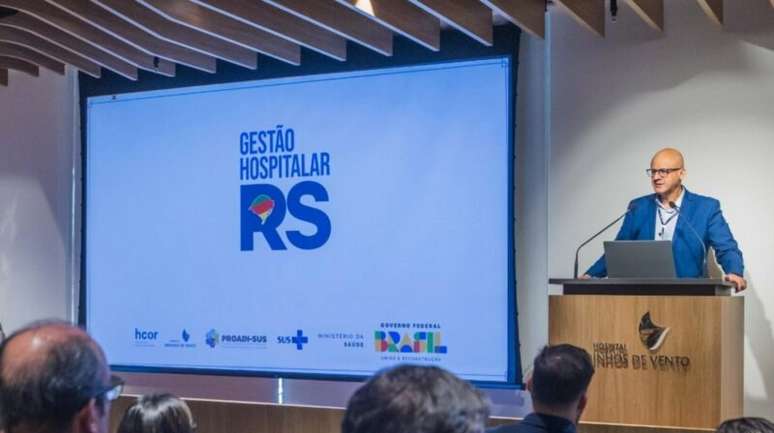The initiative serves seven public health and philanthropic institutions affected by the floods
The Moinhos de Vento (RS) and Hcor (SP) hospitals have released, this Monday (9), a diagnosis of the first measures to be implemented as a result of the first phase of the project “Emergency support for hospital management of Rio Grande do Sud”. Launched by the Ministry of Health (MS) through the Unified Health System Development Support Program (Proadi-SUS), the initiative aims to support the management of seven public and philanthropic institutions affected by the floods that hit the state.
The event, held in the auditorium of the Moinhos de Vento Hospital, brought together the managers of the participating institutions, who received reports containing emergency and situational diagnoses, recommendations and a training program to be implemented. Launched in September, the project had an investment of R$ 10 million from the Ministry of Health, with the involvement of over 20 specialists from the Moinhos de Vento and Hcor hospitals.
For the superintendent of responsibility and risk management of Moinhos de Vento Hospital, Admilson Reis, the initiative strengthens collaboration between institutions of excellence and represents a milestone in hospital management. “Since the beginning of the floods, the six excellent hospitals of Brazil, in collaboration with Proadi-SUS, have made themselves available to support these seven hospital institutions in Rio Grande do Sul. We quickly mobilized a highly qualified team and were able to develop this project in record time”, he underlined.
The teams dedicated approximately 7 thousand hours of work to the project, which involves seven hospitals in Canoas – Hospital Universitário and Hospital de Pronto Socorro – and in Porto Alegre – Hospital Presidente Vargas, Hospital Vila Nova, Hospital Restinga ed Extremo Sul and Hospital de Pronto Aiuto . Over the course of 203 meetings, 3,175 points were analysed, identifying 2,750 opportunities for improvement, 698 recommendations and the development of 48 capabilities. In addition to strategic, tactical and operational recommendations, a robust training plan, with nearly 50 hours of training, was provided to align teams and promote knowledge management.
The project was structured into 12 strategic pillars: Health Network; Corporate governance; Economic-financial; Nursing practice; Quality and safety; Support Services; Production and assistance capacity; Human Resources; Purchasing and contract management; Logistics; Infrastructure and information technology.
For Admilson, the findings have the ability to be replicated in other Brazilian hospitals. “Lessons learned can be extended to other institutions in similar conditions. This idea is already being evaluated to create a pilot platform that could help carry out emergency diagnosis and treatment in hospitals across the country,” he explained.
The executive director of social responsibility of the Associação Beneficente Syria Hcor, Joslene Menezes Rodrigues, underlined the importance of the role of all those involved: experts, administrators and employees. “From the beginning we made it clear that this project could not be yet another diagnosis left on paper. Our goal has always been to ensure that the results are translated into concrete actions. This is a project for hospital teams who work every day taking care of patients. Our role is to create the conditions for them to move forward and provide the best care possible,” he stressed.
Next steps
After the presentation of the results, the second phase of the project begins, which involves the promotion of focal operational meetings, the implementation of the recommendations and the planning of agendas for the training calendar in 2025. The implementation of the results begins this December. The training will take place between January and March. The final report is expected to be delivered in July 2025.
The technical advisor for specialist care at the Ministry of Health, Fernando Henrique Martins Silva, underlined the impact of the project. “With the conclusion of the diagnostic phase, we now enter the implementation phase. This is a unique opportunity for hospital institutions to move forward in a structured way,” he said.
The deputy secretary of Health of Rio Grande do Sul, Ana Costa, underlines the importance of the initiative. “The hospitals of Porto Alegre and Canoas have a great impact, serving as a reference for several municipalities. Any fragility in these institutions affects not only the metropolitan region, but the entire state health network. The commitment of our leaders and their teams is very important in this process of implementing the recommendations, it is a unique opportunity to obtain excellent results, which will make a difference for the entire population of Rio Grande do Sul”, he underlined.
The event was attended by the municipal health secretaries of Porto Alegre, Fernando Ritter, and of Canoas, Mauro Sparta, as well as representatives of the institutions benefiting from the initiative.
About Proadi-SUS
The Program to Support the Institutional Development of the Unified Health System (Proadi-SUS) was created in 2009 with the aim of supporting and improving the SUS through human resources training projects, research, evaluation and incorporation of technologies, management and specialized assistance required by the unified health system. of the Ministry of Health, the program today brings together six non-profit hospitals that are a reference in the quality and management of medical care: Hospital Alemão Oswaldo Cruz, BP – A Beneficência Portuguesa de São Paulo, Hcor, Hospital Israelita Albert Einstein, Moinhos de Vento Hospital and Sírio-Libanês Hospital.
Proadi-SUS resources come from the tax immunity of participating hospitals. The projects make the hospitals’ expertise available to the population in initiatives that respond to the needs of the SUS. Among the main advantages of Proadi-SUS, we highlight the reduction of waiting lists, the qualification of professionals, research in the interest of public health for the current needs of the Brazilian population, treatment management supported by artificial intelligence and a better management of public hospitals and philanthropic organizations throughout Brazil. For more information on the Program and the projects underway in the current three-year period, access the Proadi-SUS portal.
Source: Terra
Rose James is a Gossipify movie and series reviewer known for her in-depth analysis and unique perspective on the latest releases. With a background in film studies, she provides engaging and informative reviews, and keeps readers up to date with industry trends and emerging talents.







